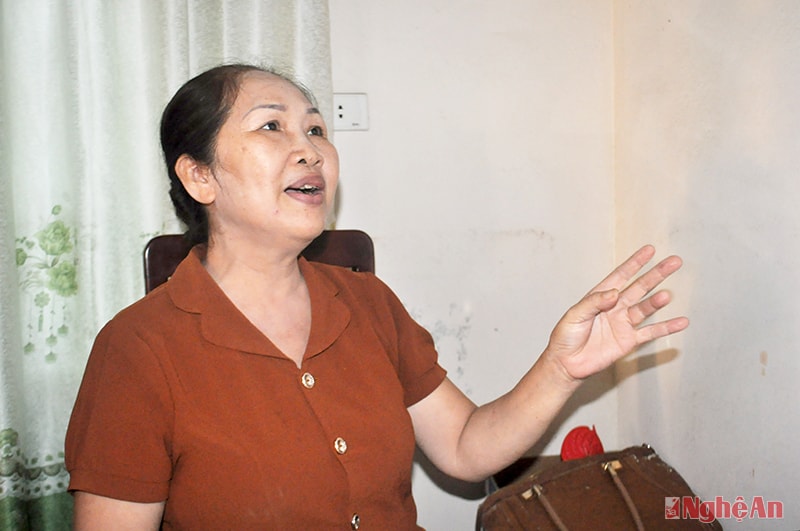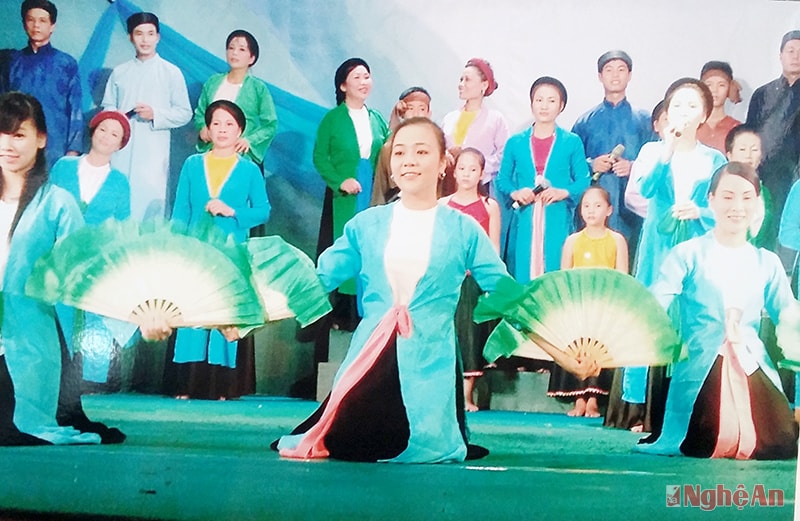A "good relationship" with Nghe An folk songs
(Baonghean) - She said she had no childhood until she learned to sing. And when she sang, that was also the moment when sadness and nostalgia arose "to the point of being numb". When she realized that, through singing, all the joys and sorrows of human life could be released to fly, like a kite, and the thread that anchored them was love for family, homeland, and country, artist Hoang Thi Cam Van felt she could "live", be happy, and share... A good fate in her life, as she said, was coming to Nghe An and singing Nghe An folk songs.
DWhat urged me to meet Ms. Van was because I wanted to know what fate had brought a native of Quang Binh to become a folk artist singing folk songs of Nghe An. And I heard the passionate melodies of the river, the Duc Son miles, the transplanting ward songs... as if she had been born on this land and had been singing for a long time. She said that as a bride of Nghe An, she had brought back so many tears of her life to sing. “I am from Quang Binh, I know that with my voice, singing folk songs of Nghe An will certainly not be standard or good, but I love folk songs of Nghe An so much that I cannot not sing them. So day and night, I listened, I practiced and I stepped out on stage to sing. The applause of the audience gave me more confidence. And I know that our people also love folk songs very much.”
 |
| Artist Hoang Thi Cam Van. |
Born in 1957, from Loc Ninh, Dong Hoi, Quang Binh, Ms. Van said that she did not have a childhood, because from birth until she was 9 years old, she grew up in shelters. The fierce destruction of bombs and bullets was a haunting memory for children growing up in this poor, windy, sandy countryside. What do I remember most? Yes, I remember nothing but the mouths of the shelters. What do I remember except the green leaves peeking out as camouflage, through which I could occasionally see a tiny piece of gray or blue sky. What do I remember except the howling of bombs, guns, and bullets that seemed to tear the ground apart? What do I remember except the musty smell, and the fear that had become so familiar that it was no longer fear. And, above all that cruelty, was my mother's singing. My mother sang lullabies, sang folk songs, and house songs... Strangely, my mother often sang songs filled with joy... Ms. Van recalled with tears in her eyes.
Her parents gave birth to 6 children, one of her younger siblings died from cluster bombs during those years. She said, at that time she was only 9 years old, following her relatives in the village to help her mother with rice farming in the forest (in those days, the fields were destroyed by bombs and bullets, people often had to go deep into the forest to clear the fields and grow rice). In the afternoon, she heard the news that her younger sister had died. The pain covered the family and the village. Little Van was stunned, unable to cry out loud. Not long after, the family received the news that her father had sacrificed himself on the battlefield... Was it the pain that forged people's extraordinary courage and endurance? Was it the pain that created anger? Ms. Van asked me, as if asking herself, to answer that, perhaps that was why her brothers volunteered to join the army, the frontline laborers serving on the battlefields.
At the age of 9, Van was evacuated (also known as K8 - according to the Central Party's plan 8 to move people out of fierce war zones) to Thanh Hoa. A poor family adopted her. Life was still full of hardships, but for the first time she knew about collective activities, team activities and the true joy of childhood. The sky she saw now was much larger than the sky through the leaves in the shelters. The ground was also much more peaceful than the ground that was always shaken by the roar of bombs. "Those were the most remarkable days of my childhood" - she said.
 |
| A folk song performance composed and performed by artist Hoang Thi Cam Van. |
But, even though she was happy and at peace, she still couldn't stop missing her home, her hometown, her land of hardship and resilience. One time, while washing dishes by the pond in her house, little Van cried for her mother. Missing her mother, she sang for the first time in her life, a song based on the folk song of Binh Tri Thien that her mother often sang: "Oh, oh... The Party's grace is as high as the sky, as wide as the sea/ Steadfastly rowing through the waves to the open sea/ Sweeping away the dark clouds in the sky/ Bringing back the glory of the Fatherland..." Suddenly, there was the sound of applause and praise: "Van sings so well!" It seemed to be the praise of a neighbor. That praise brought a great joy to the little girl who was burdened with hidden sorrows. She boldly sang in children's activities, and received more and more praise...
After 2 years of evacuation, Hoang Thi Cam Van was picked up by her brother. Due to difficult family circumstances, her mother had to take care of her younger siblings, so her grandparents took her home to raise her. During this time, she also actively participated in local mass movements. In 1972, she joined the militia and carried the wounded. In 1975, she volunteered to join the army. On the day of enlistment, she represented hundreds of female soldiers in the district to read the letter of determination to go to war. After a short training period, Van was assigned to work as a nurse to care for wounded soldiers at Military Hospital 41 (Bo Trach, Quang Binh). After the victory on April 30, 1975, she worked in Regiment 174, Division 316B stationed in Quang Binh, then moved to do business in Que Phong, Nghe An. Later, she transferred to Division 442 stationed in Thanh Hoa, and here, she met and married her husband from Nghe An. Her husband was a political commissar, and joined her in a battalion art troupe. In 1978-1979, she transferred to Military Hospital 4 and both husband and wife decided to return to his hometown (Vinh Tan - Vinh City) to live.
Throughout her military career, Ms. Van not only fulfilled her duties as a soldier but also devoted her singing to serving wounded soldiers and her comrades in the unit. She participated in many art competitions and won several awards. For her, those were exciting and meaningful days…
It was not until 1988, when she worked at Vinh City, that she truly "fell in love" with Nghe An folk songs. She said: "I remember, that day, I heard Ms. Le Thanh sing Nghe Tinh folk songs, I was so fascinated. There was something like flesh and blood, it rolled inside me with an extremely familiar feeling". Then when she retired, she returned to her locality to take on the responsibility of being the Head of the Phuc Tan Women's Association, Vinh Tan Commune (Vinh City). Realizing that the women all loved art, but there was no initiative and gathering, Ms. Van took on the responsibility of mobilizing the establishment of an art troupe, encouraging the women to learn and sing folk songs. During the times she led the art troupe to exchange and participate in art competitions, Ms. Van remembers being extremely impressed with the Nghe folk song performance staged by teacher Lien in Vinh Tan, she nurtured in herself the wish that she would know more, understand more about Nghe An folk songs.
That love and passion urged Ms. Van to learn to sing folk songs. She bought tapes and discs, then practiced persistently. She never missed a folk song lesson on television. She also did not think she could succeed, until her first Nghe Tinh folk song was timidly performed on stage and received enthusiastic cheers from the audience. At that time, she felt extremely happy. It was no different from the feeling of a 9-year-old girl who first sang by the pond years ago and received precious compliments from her neighbor.
Then Ms. Van was the main factor in the movement to establish and build the "brand" of the ward's art troupe, later the Vinh Tan Ward Folk Song Club. She worked hard to research and adapt folk songs from Nghe An to popularize them for her ward's club. Few people know that the unique lyrics that have received a lot of response from the audience were formed from the passion of "chairwoman" Hoang Thi Cam Van. Vinh Tan Ward Folk Song Club has participated in large and small programs using self-composed and self-performed performances. This is also one of the clubs that has been highly appreciated by experts through competitions as well as in the routine of activities and practice. Participating in city and provincial folk song festivals, the ward's club has always won prizes. Artist Ngoc At (Center for Preservation and Promotion of Nghe An Folk Heritage) said: “Vinh Tan Ward Folk Song Club is recognized as a provincial cultural model. In that common success, there is a great contribution from Ms. Van, who has a deep love for Nghe An folk songs. She deserves the title of artist that has been conferred upon her.”
For Ms. Van, singing well is not enough. It also requires enthusiastic and dedicated hearts, so that the singing can truly move people's hearts. She said, if love and passion are greater than anything else, we will get very surprising results. Like her, for example, if she kept thinking that she would never be able to sing Nghe folk songs well because she was an "outsider", she would forever stop and not dare to pursue her dream.
She said, if she could say a word of thanks, she would say thank you to this land. As for me, I also want to say a word of thanks to her, the daughter of Quang Binh who “brought tears” of a hard and difficult life to become a daughter-in-law of Nghe An and turned them into songs of love.
Article and photos:Thuy Vinh - Thu Huong






